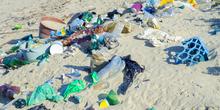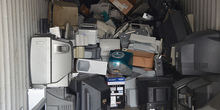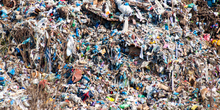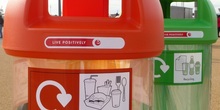Natural Resources & Waste
Our Work
Latest in Waste Legislation & Policy
-
Tackling marine litter with the circular economy and the EU Plastics Strategy
IEEP identifies how the EU Plastics Strategy and Circular Economy Action Plan provide a unique opportunity to address marine litter and its impacts.
-
Plastics, Marine Litter and the Circular Economy
Briefing and three product fiches explore circular economy solutions for reducing the flow of plastic waste into the oceans.
-
Biofrontiers – sustainability critical to the development of advanced biofuels
Adherence to effective and workable sustainability criteria is an essential requirement when using public support to incentivise advanced alternative fuels.
-
Greening taxes and subsidies in the Pacific
IEEP will share its expertise on environmental taxation and the reform of environmentally harmful subsidies at a forum event on greening taxation and subsidies in the Pacific region during the IUCN World Conservation Congress in Hawaii.
-
The cascading use of woody biomass in the EU – challenges, opportunities and policy solutions
Improving the resource efficient use of wood through cascading the resource from one use to another, requires action throughout the wood flow. Current efforts focus on recovering and re-using waste wood but more could be done with the production and utilisation of wood processing residues and improving the balancing between the material and energy use of wood.
-
Mapping study on the cascading use of wood products
Promoting the cascading use of wood through policy is one approach to improve resource efficiency and increase the overall availability of wood for use in a variety of sectors.
-
The importance of tackling environmental crime
IEEP supported the final conference of the EU EFFACE project, focusing on the importance of adopting improved measures to tackle environmental crime.
-
Quantified impacts and costs of environmental crime
As part of the European Union Action to Fight Environmental Crime (EFFACE) project, IEEP researchers have examined the impacts of illegal e-waste shipments from the European Union to China.
-
How to stimulate a bio-economy based on waste? – A study for the UK Government
Waste resources have the potential to provide a core component of developing bio-economies across the globe. A new IEEP report reviews how waste has been incorporated into existing bio-economy strategies, and the conditions that have enabled this.
-
New open access book on marine litter
A new book, 'Marine Anthropogenic Litter', has been published comprising 16 chapters on various aspects of the complex issue of litter in the world’s oceans. Researchers from IEEP contributed a chapter on the economics of marine litter. The whole book is free to view online.
-
Tackling environmental crime
A workshop on environmental crime was held on 25 March in Granada, Spain, with Andrea Illes from IEEP providing insights into illegal e-waste shipments from the EU to China.
-
Case studies focusing on different types of environmental crime
IEEP, as being part of a 40-months EU-funded research project, produced three case studies focusing on illegal e-waste shipment, illegal localised pollution incidents and illegal fishing.
-
The Manual: Chapter 7 - Resource use
This is a chapter of IEEP’s Manual of European Environmental Policy. This is a chapter of IEEP’s Manual of European Environmental Policy. This chapter illustrates the variety of EU laws, policies and guidance documents that have been adopted to improve the efficiency of our use of natural resources and to reduce environmental impacts throughout a product's life cycle.
-
The Manual: Chapter 6 - Waste
This is a chapter of IEEP’s Manual of European Environmental Policy. This chapter on EU waste policies focuses on the management of waste, the environmental requirements with which waste management installations must comply and the big picture policy initiatives focused on waste.
-
Environmental policy and the UK’s review of the EU Balance of Competences
The UK Government’s Balance of Competences review has now taken evidence on 25 subject areas, including the 6 with the most relevance for the Environment. We take stock of the IEEP’s contributions, and consider what a possible UK renegotiation might mean for the environment.
-
The Waste Shipment Regulation – practical and enforceable?
The Waste Shipment Regulation is a major challenge for Member States to implement. IEEP gathered the views and experience of IMPEL members on its practicability and enforceability, to help inform any future legislative development and aid competent authorities to work together to enhance their implementation of the Regulation.
-
EU waste law: the challenge of better compliance
Waste management in the EU is improving, but implementation by the Member States of EU waste legislation remains patchy. This paper makes suggestions on how better compliance could be achieved.
-
Economic instruments to improve waste management
This report investigates a range of economic instruments in place in the EU Member States to improve waste management. It focuses on disposal taxes, pay-as-you-throw systems and producer responsibility schemes, and attempts to assess their contribution to waste management performance.
-
Review of the Waste Thematic Strategy
This report supported the European Commission’s review of the Thematic Strategy on the Prevention and Recycling of Waste. It summarises available data on waste management in the EU, assesses progress towards the EU becoming a ‘recycling society’, outlines the achievements of the Waste Thematic Strategy, and makes recommendations for the development of future EU waste policies.
-
Improving Enforcement of Waste Shipment Controls
Should there be more explicit obligations for inspections of waste shipments in EU law? The Commission has launched a consultation drawing on IEEP’s work.
Highlights
-

Plastics, Marine Litter and the Circular Economy
Briefing and three product fiches explore circular economy solutions for reducing the flow of plastic waste into the oceans.
-

The cascading use of woody biomass in the EU – challenges, opportunities and policy solutions
Improving the resource efficient use of wood through cascading the resource from one use to another, requires action throughout the wood flow. Current efforts focus on recovering and re-using waste wood but more could be done with the production and utilisation of wood processing residues and improving the balancing between the material and energy use of wood.
-

Quantified impacts and costs of environmental crime
-

How to stimulate a bio-economy based on waste? – A study for the UK Government
-

Economic instruments to improve waste management
